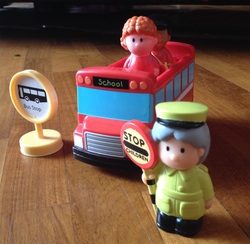 Stop the bus
Stop the bus Having lived in five countries I've been lucky enough to get a snapshot of how people live their lives in different ways. And it's been fascinating. I've also observed the same routines with different approaches. Let's take something as simple as a school bus ride.
US: with more land and space, schools are spread out. This is home to the iconic yellow bus, which picks your child up from your house and deposits them back again. The system works.
UK: there isn't really a comprehensive school bus system. Families live as close to their chosen school as possible, within "catchment areas" or invisible pens that serve only to push up house prices. So catching a school bus is not so much a well organised integrated system, designed to keep the roads clear and help parents organise siblings forced to go to separate schools: unless you live more than three miles from the school when the bus service, if available, is invaluable.
Kuwait: my knowledge here is thirty years old and I'm not going to pass judgment on whether the system works or not. But as a schoolchild I caught the bus from my flat every day without fail. With only the bus driver to keep charge, the journey was always raucous and loud, and I'd be tipped out into a busy sandy car park, and at the age of seven, with my five-year-old sister in tow, I'd be expected to find my way to my class. But I live to tell the tale.
UAE: I now have school-age children, so I took a keen interest in the bus system from the perspective of a mother. The UAE has similar space issues as the US. It's spread out and sprawling. The difference is that most mothers don't work, as part-time positions are hard to come by, making it tricky to balance the needs of children and corporate life. So mothers drive their children to school. But there is another reason why they offer this taxi service. I once saw a bus, with its wheels pointing forwards. And what's odd about that, you ask? The body of the bus was not. It was driving along a busy motorway with its shell at a very peculiar angle to its chassis. So much for safety first.
Singapore: We're now living in a place that is neat, tidy, orderly and respects my OCD. Our children's school is half an hour's drive away, and with the extortionate car prices we don't have wheels of our own. So I’ve done my sums. I could take public transport but from where I live that would take up at least four hours of my day. I could take a taxi, but that costs as much as the bus service. So for the first time I've taken a deep breath and handed over some responsibility. It's scary but, in the main, the buses run like clockwork, and as well as the driver, there is a bus "Aunty" making sure the children behave and wear their seat belts.
As a mother you are born to worry, and a part of my mind is always thinking about the children and whether they are safe. There have been incidents when the bus has been late, and even early, dropping my children at the roadside without supervision. Of course, there are policies and procedures in place to try to prevent this for happening, so incidents are rare, but it only takes one incident for something to go wrong.
So it was with interest that this week I learnt about mybusmate. This new communication app could help make the school bus run safer and more efficient. It’s a simple hub that links schools, bus operators and parents. It enables parents to monitor their children’s commutes by tracking the bus in real-time. No more waiting around in the rain for a late bus to arrive. No more safety concerns about children getting off the bus early. It can be used as a two-way messenger; an electronic register, checking children on and off the bus; as well as simplifying logistics for bus operators. Once schools and bus operators have adopted the service, it is free to parents. To me, it’s not so much a piece of technology as potentially peace of mind.



 RSS Feed
RSS Feed
